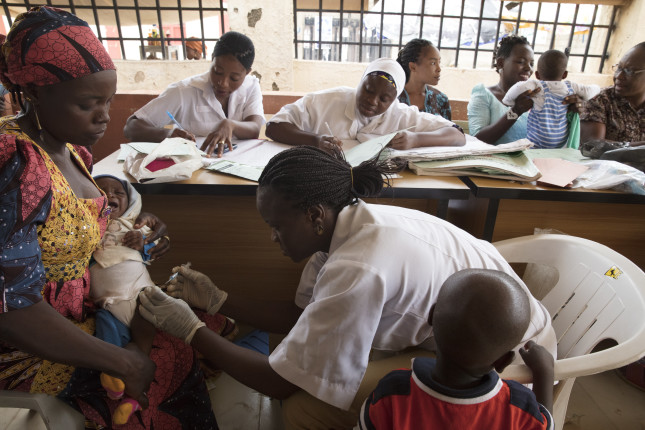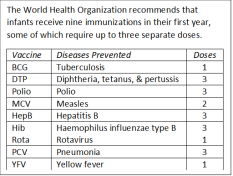-
Understanding Hesitancy for Childhood Vaccines in Nigeria – It’s Not Just About COVID-19

Vaccination hesitancy, even in the midst of a global pandemic, is a major barrier to the elimination of several highly contagious and deadly diseases. While COVID-19 vaccines are getting the most attention, they are not the only vaccines that protect against deadly contagious diseases. And as with the COVID-19 vaccines, around the world, many communities are insufficiently covered by vaccines—particularly children. This is especially true in West Africa, where—though improving—childhood immunization rates still lag behind much of the world. To explore reasons for these persistent low childhood immunization rates, Breakthrough RESEARCH, a USAID-funded project that works to expand the evidence base for social and behavior change programming, increase healthy behaviors, and enable positive social norms through improved social and behavior change programming, conducted a study to look at behavioral drivers of decision-making about vaccines in Nigeria.
Vaccination Rates in West and Central Africa Remain Extremely Low
Routine childhood immunization is one of the most cost-effective public health interventions, estimated to avert 2 to 3 million deaths per year. The routine vaccinations recommended in an infant’s first year protect against harmful and deadly diseases including polio, tuberculosis, yellow fever, measles, diphtheria, and hepatitis B. Most of these vaccines require more than one dose, requiring parents to bring their infant to multiple wellness visits during their first year of life to be fully vaccinated.

In 2019, only 66 percent of infants in West and Central Africa were fully vaccinated against diphtheria, tetanus, and pertussis. This is the lowest level of coverage for this vaccine in the world, and significantly lower than the global average of 85 percent.
In the region, Ghana and Sierra Leone come closest to full coverage for the five recommended immunizations that require a series of three doses. Ghana has achieved 97 percent coverage for all three doses of DTP, Polio, HepB, Hib, and PCV. In contrast, Nigeria, Central African Republic, and Democratic Republic of Congo have achieved less than 60 percent coverage for these five vaccine series. Given Nigeria’s large population, the low levels of childhood vaccine coverage mean that the country has more under- and unvaccinated infants than any other country in West and Central Africa.
Understanding Drivers of Low Vaccine Coverage in Nigeria
The Breakthrough RESEARCH study—developed to capture data on the psychosocial drivers of behavioral outcomes in the areas of family planning; malaria; and maternal, newborn and child health, and nutrition—found that as of 2020, only 6 percent of young children ages 12-23 months were fully vaccinated by their first birthday in northwestern Nigeria. Understanding the reasons why childhood immunization rates in this part of Nigeria remain so low can yield insights on how to address vaccine hesitancy across this region.
Data gathered from over 3,000 women showed that knowledge of vaccine safety and efficacy was extremely low among the women surveyed, and that many women misunderstand or are not aware of how important vaccines are to protect their child’s health in the first years of life. Only 25 percent knew that children should receive their first vaccinations at birth; 28 percent believed that vaccines were either not effective or were unsure about their effectiveness; and 54 percent believed or were unsure if vaccines contain chemicals that are dangerous to a child’s health. Women who believed that vaccines would prevent severe illness were more than twice as likely to vaccinate their child.
Husband and Health Worker Support is Critical
Although factors such as distance to health facilities and quality of care played a role in whether young children received vaccines, the study highlights the influential role that husbands and health workers can play. Women whose husbands supported their vaccination decision were 60 percent more likely to have their child receive all three doses of DTP and 40 percent more likely to have their child receive the measles vaccine than those without spousal support. Women who said health providers influenced their decision were more than twice as likely to have their child receive all basic vaccinations. These findings illustrate that efforts to increase knowledge and address misconceptions about vaccines must identify and target individuals who influence women’s decision making. In this case, husbands and health workers may be as important to reach as the women themselves.
In Northwestern Nigeria, communities need more knowledge about the safety, efficacy, and appropriate timing of childhood routine immunization. Crucially, this information needs to reach both parents and caregivers, particularly in contexts where power imbalances in decision-making are most dynamic.
Since health workers were found to be an important influence on women’s decision-making, another effective strategy to boost vaccine uptake is to ensure that health workers have comprehensive information about the safety and efficacy of vaccines and counsel women using this information, especially during antenatal or postnatal visits.
Moving Forward for More Vaccine Coverage
Social and behavior change (SBC) programs to promote childhood vaccinations in northwestern Nigeria can use these study findings to better tailor their efforts. In particular, programs should seek to promote and improve spousal support for women’s decision-making around vaccines for children. At the same time, encouraging pregnant women to attend antenatal care services may serve as an entry point to receive counselling on routine immunization from healthcare providers. Breakthrough RESEARCH’s sister project, Breakthrough ACTION, is using findings such as these to address drivers of vaccine hesitancy for both COVID-19 and routine childhood vaccinations.
Increasing the reach of routine childhood vaccinations, as well as the new COVID-19 vaccines, will save lives and improve health. At the same time, the attention on COVID-19 vaccines presents an opportunity to address myths, misconceptions, and barriers for ALL vaccines, in northwestern Nigeria, West and Central Africa, and around the world.
Udochisom Anaba is a Research Coordinator for Tulane University School of Public Health & Tropical Medicine under the Breakthrough RESEARCH project in Nigeria.
Marissa Pine Yeakey is a consultant to Population Reference Bureau on the Breakthrough RESEARCH project.
Sources: Breakthrough RESEARCH, UNICEF.
Photo Credit: Mothers have their babies vaccinated at the Primary Health Care Maraba, in Karu, Nigeria. Photo used with permission courtesy of flickr user Dominic Chavez/The Global Financing Facility.
 A Publication of the Stimson Center.
A Publication of the Stimson Center.







